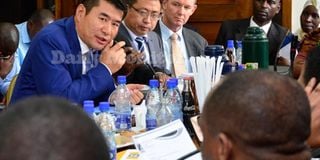MPs accuse Chinese road company of blackmail

The managing director of China Communications Construction Company, Mr Zhong Wei Dong (left), stresses a point before the Parliament Committee on Commissions, Statutory Authorities and State Enterprises yesterday. PHOTO BY ERIC DOMINIC BUKENYA
What you need to know:
- Mr Zhong Weidong told MPs on the House Committee on Commissions, Statutory Authorities and State Enterprises that China is in Africa, and in this case, Uganda, merely to help the latter to develop.
- Committee chair Katuntu told journalists on Wednesday that this was yet another landmark in finding tax payers’ money that had been misappropriated.
- Mr Zhong’s remarks that China could withdraw its assistance to Uganda infuriated members of the committee, who then shouted him down.
PARLIAMENT. Under pressure to answer questions when he appeared before a parliamentary committee, a Chinese official yesterday angered MPs with the pompous claim that his country could withdraw its ‘assistance’ to Uganda.
Mr Zhong Weidong had been asked to explain how the company for which he works secured the $475 million (Shs1.7 trillion) Entebbe Expressway contract.
Apparently feeling slighted, Mr Zhong chose to tell MPs on the House Committee on Commissions, Statutory Authorities and State Enterprises (Cosase) that China is in Africa, and in this case, Uganda, merely to help the latter to develop.
“China assists African countries to develop. If you don’t like, it can stop; we can stop,” Mr Zhong said. “We are not a private company; we are a state company.”
He said his country provides many African countries with concessional loans – loans whose interest rate is usually below 2 per cent. Mr Zhong is the managing director of China Communications Construction Company (CCCC).
The company, which Cosase summoned last week to explain how it got the contract, said Chinese leaders and President Museveni, met in 2009 in Egypt and nodded to the contract.
Officials of the so-called ‘Old Uganda National Roads Authority’ said the then secretary to the Treasury Chris Kassami had introduced CCCC to Unra.
Mr Zhong’s remarks that China could withdraw its assistance to Uganda infuriated members of the committee, who then shouted him down.
“The company you represent got a contract [to construct the Entebbe Expressway]. How did it get this contract? That you have to explain, do not trade in blackmail. Respect this country,” Cosase’s chairman, Abdu Katuntu, said.
“Much as your shareholding is Chinese government, you are here as private contractors.”
Mr Katuntu added the money being used to finance the expressway is a loan, which Uganda will have to pay.
Kitgum Woman MP Beatrice Anywar said the witness was undermining the integrity of Parliament.
“The witness should withdraw the statement and apologise,” Ms Anywar said.
According to the Brookings Institute, a United States of America think-tank, China provides eight types of foreign aid.
In a February 14, 2014 op-ed for the Institute, Yun Sun notes that China’s aid to Africa covers agriculture, education, transport, energy, communications and health.
Sun adds that: “China is not helping Africa in exchange for nothing. Chinese projects create access to Africa’s natural resources and local markets and employment for Chinese labourers.”
In a related development, the same committee has caused the recovery of more than Shs1.8b from Chongqing International Construction Corporations, another Chinese contractor.
The money was erroneously paid by the Uganda National Roads Authority during the time Mr Kimeze Sebbuga was the executive director.
Committee chair Katuntu told journalists on Wednesday that this was yet another landmark in finding tax payers’ money that had been misappropriated.
“Parliament and the committee have taken a strategic decision that all monies misappropriated will be recovered,” he said.
The push for money recovery, Mr Katuntu said, was a course of action that would apply across the board.
The committee last week ordered Chongqing International Construction Corporations to refund the money after it was discovered that the company had obtained the money under falsehoods.
According to the revelations, Chongqing International Construction Corporations in 2013 received the money as payment from Unra in compensation for delayed issuance of an environment assessment report by the National Environment Management Authority to okay the construction of Vurra-Arua-Koboko road. The committee learnt that there was no need for compensation since Nema had issued the assessment within only four months instead of six as provided for in the laws.
Documents in possession of the committee show that Chongqing Internal Construction Corporations paid back the money on November 25 to Unra Account No. 9030006387976 in Stanbic Bank.




